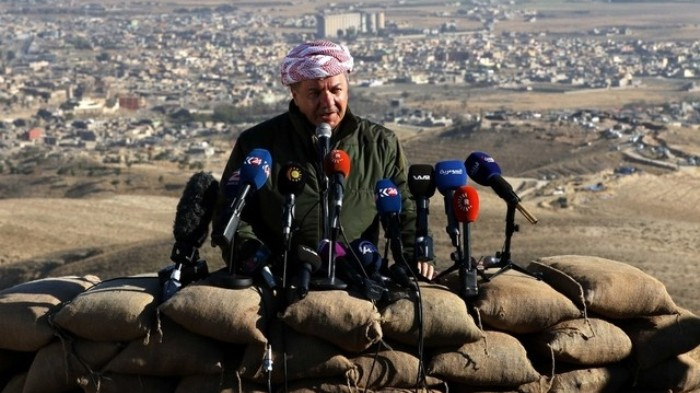Sinjar’s Benefits for Barzani

On November 13, 2015, Sinjar, in northern Iraq, was liberated from the hands of ISIS. The Yazidi-majority city of Nineveh Province had fallen into the hands of the so-called Islamic State fighters in August 2014. Wresting Sinjar from ISIS was a key point in the battle against the terrorist group.
Besides the Yazidis, a religiously distinct Kurdish community, a main benefactor of the victory seems to have been Masoud Barzani, President of the Kurdish Regional Government (KRG). Barzani's remarks following the military operation that led to the expulsion of ISIS from Sinjar show that he seeks political gain from the victory for both his current political status and future plans regarding the Kurdistan region of Iraq.
Following the official announcement of the liberation of Sinjar, Turkish PM Ahmet Davutoglu congratulated Barzani in a phone conversation. Davutoglu stressed support for Erbil's struggle against terrorism and announced that Ankara is ready to treat Kurdish fighters, the peshmerga, in Turkish hospitals.
Barzani has put a strong accent on the role of the pershmerga in taking control of Sinjar, and has minced no words in stressing that only the Kurdistan Region flag should be raised in Sinjar. His remarks drew reactions from the Iraqi PM Haydar Al-Abadi on Monday (November 16, 2015). The head of Iraq's central government stressed the role of the Iraqi Army in the liberation of Sinjar beside the Kurdish peshmerga, and emphasized that the Iraqi flag, and not the KRG flag, should be raised in the city.
Barzani's provocative remarks are not new, however, and are not limited to the symbolic matter of who should hoist whose flag. He reiterated his plan to carve out Sinjar from Nineveh and turn it into a new province under the control of his own Kurdish Regional Government. Two months earlier, Barzani had stressed that he would not hand control of Sinjar over to any other party and would go ahead with the plan to annex the city to KRG, albeit in coordination with Baghdad.
The KRG President seems determined to take advantage of the recent developments in his relations with both local rivals in the Kurdistan region and the central government in Baghdad.
Barzani may turn the peshmerga presence in Sinjar as leverage against the central government in Baghdad and fuel pro-independence sentiments among the Kurdish community.
The Kurdish statesman may also seize the opportunity to tackle the legitimacy crisis he has been facing in the recent months within his own domain where he has been facing serious objections against the continuation of his presidency over the Kurdish Regional Government. The Patriotic Union of Kurdistan, under the leadership of Jalal Talebani, and the Movement for Change (Gorran) headed by Nawshirwan Mustafa, insist upon Barzani's resignation from power and the launch of elections to choose the next president of the region. Tensions over the dispute have resulted in sporadic violence.
Facing strong domestic opposition, Barzani has looked towards foreign powers, especially the US and Turkey, for support. The KRG President has frequently warned that his resignation from the post may weaken the peshmerga forces in their battle against ISIS. To receive further support from Ankara, Barzani has hinted at selling oil at a lower price to Ankara and cooperation to turn the Turkish port of Ceyhan into a transit hub for the Kurdish oil.
* This piece was originally published in Tabnak, a popular news website affiliated with Mohsen Rezaei, former commander of IRGC.

